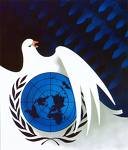Problem: The military has, in reality, issued almost no papers. The combined Palestinian population for the occupied West Bank and occupied East Jerusalem (but excluding Gaza and also Israel proper) is 1.73 million. Alarmed human rights groups assert that tens of thousands of Palestinians are at risk of forced expulsion. [5 a]
The military rules regarding military-issued papers are pure bureaucratic evil; rules made up as the occupation chooses, when it chooses, and for whom it chooses. [6]
I invite CPCCA members to consider that if criticism of a state is criminalized, Canada risks pariah status having positioned itself on the side of oppression. Canada, in my view, will be at very real risk of being seen as a hollow shell of a former democratic state.
In written testimony to the U.S. Senate Armed Services Committee, Tuesday, March 16, 2010, General David Petraeus, commander of the U.S. military's Central Command, shared this view:
"The enduring hostilities between Israel and some of its neighbors present distinct challenges to our ability to advance our interests," he said in the written testimony. "Arab anger over the Palestinian question limits the strength and depth of US partnerships with governments and peoples in the [Middle East] and weakens the legitimacy of moderate regimes in the Arab world." [7]
A tectonic shift in awareness is happening. Across the U.S. and Canada, student associations on campuses from coast to coast are finding ways to support the cause of freedom for the Palestinians. The method of choice is to join the BDS movement: boycott, divest and sanctions. (This dovetails with the Palestinian embrace of nonviolent resistance. Paradoxically, as the power of nonviolent resistance is realized and takes hold, violence against Palestinians appears to be increasing.)
A few weeks ago, the University of California Berkeley Students Association, after months of painstaking research into the university's investment portfolio, crafted a motion to recommend that the university divest from two American companies - General Electric, and United Technologies.
From the motion:
WHEREAS, General Electric holds engineering support and testing service contracts with the Israeli military and supplies the Israeli government with the propulsion system for its Apache Assault Helicopter fleet, which, as documented by Amnesty International and Human Rights Watch, has been used in attacks on Palestinian and Lebanese civilians, including the January 4, 2009 killings of Palestinian medical aide workers11; and1. WHEREAS, United Technologies supplies the Israeli government with Blackhawk helicopters and with F-15 and F-16 aircraft engines and holds an ongoing fleet management contract for these engines, and, Amnesty International has documented the Israeli government's use of these aircraft in the bombing of the American School in Gaza, the killing of Palestinians civilians, and the destruction of hundreds of Palestinian homes; therefore, be it resolved...'; [7a]
When the evening arrived when the motion was to be put to the floor the venue had to be changed several times to hold the growing crowd. Hundreds showed. Nobel peace prize winners wrote their support, including Archbishop Desmond Tutu. The Archbishop's letter concludes:
'To those who wrongly accuse you of unfairness or harm done to them by this call for divestment, I suggest, with humility, that the harm suffered from being confronted with opinions that challenge one's own pales in comparison to the harm done by living a life under occupation and daily denial of basic rights and dignity. It is not with rancor that we criticize the Israeli government, but with hope, a hope that a better future can be made for both Israelis and Palestinians, a future in which both the violence of the occupier and the resulting violent resistance of the occupied come to an end, and where one people need not rule over another, engendering suffering, humiliation, and retaliation. True peace must be anchored in justice and an unwavering commitment to universal rights for all humans, regardless of ethnicity, religion, gender, national origin or any other identity attribute. You, students, are helping to pave that path to a just peace. I heartily endorse your divestment vote and encourage you to stand firm on the side of what is right.' [8 a]
The debate raged into morning: students, rabbis, politicians, civic leaders [8 b] and people of all faiths and backgrounds. The vote passed 16 - 4. It was subsequently vetoed by one vote - by the student's association president, Will Smelko, who wasn't even there that night.
A few weeks later, again, the vote was brought around to overturn the veto and permit the original results of the first vote to hold. Again, overflow crowd of hundreds; room changed; hours of debate into morning.
I followed inspiring tweets on Twitter from students such as isaacnoah.
Next Page 1 | 2 | 3 | 4 | 5 | 6
(Note: You can view every article as one long page if you sign up as an Advocate Member, or higher).





